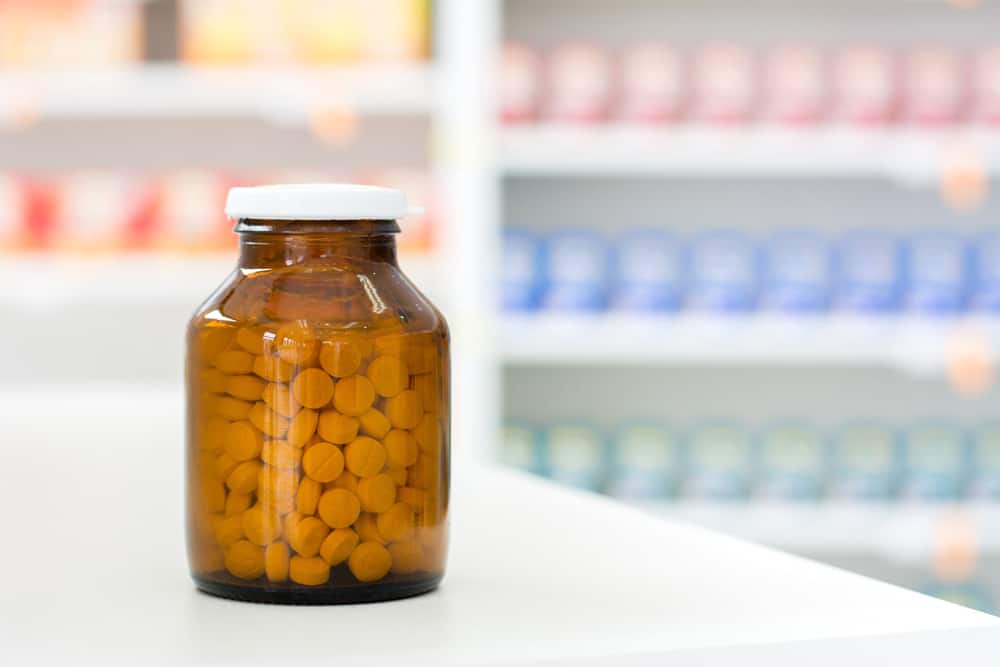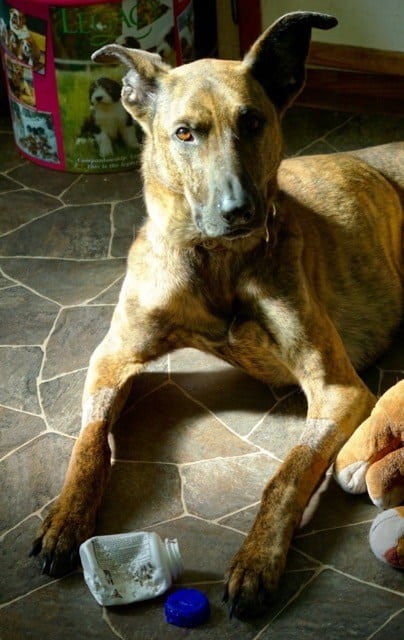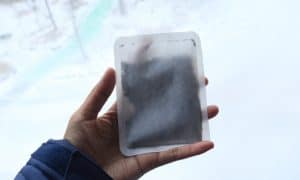“This post contains affiliate links, and I will be compensated if you make a purchase after clicking on my links.”
Most medications warn you to keep out of reach of children, but in Diane Spray’s home that warning now applies to her pets. Spray, who works late hours in Wausau, WI, recently came home at 3 a.m. to find her dog Abby “acting sheepish like she’s done something naughty.”
Initially, she couldn’t see anything that could cause the behavior, but when she found a chewed ibuprofen bottlecap in Abby’s mouth, she knew immediately what must have happened.

“I usually keep a big bottle of ibuprofen in my work bag, but I remembered that I had left a new bottle on the kitchen table,” explained Spray. “After I found Abby with the bottlecap in her mouth, I realized she had gotten into the medication, but I couldn’t find the bottle. Once I did, it was clear she had destroyed the packaging and ingested nearly 500 caplets. At first, I didn’t know what to think, but 500 of anything is bad. The question was, how bad? I Googled ‘dogs and ibuprofen’ and realized it was really, really bad.”
“My first call was to our local emergency veterinary clinic, PAW Health Networks, and they recommended we call the experts at Pet Poison Helpline next. That way I could explain what had happened, and the clinic staff could liaise with the toxicology specialists from the Helpline. When calculating the dose she ingested, the Helpline said this massive amount could readily cause death in a dog. While I was on the phone with them, Abby vomited, and they recommended I take her in immediately.”

Once at PAW Health Networks in Wausau, they induced vomiting and administered an oral charcoal treatment, which is a common procedure for poisoning. They also placed her on IV fluids to help protect her kidneys. Over the next few hours, Abby became so sedate she was nearly non-responsive, a worrisome complication that can develop in large overdoses of ibuprofen. To help combat this, Abby was given two doses of naloxone, which is designed to rapidly reverse an opioid overdose. Even though ibuprofen is not an opioid, naloxone is sometimes helpful in treating severe sedation from ibuprofen and some other poisonings. Unfortunately, this therapy was not successful for Abby and her condition continued to deteriorate. A series of blood tests confirmed that Abby’s organs were starting to fail, and the toxicology professionals at Pet Poison Helpline recommended an unusual next step – intravenous intralipid emulsion treatment (ILE), a lifesaving treatment of fat-soluble drug intoxications.
“The use of lipids with NSAID (nonsteroidal anti-inflammatory drugs) poisoning is relatively new and somewhat controversial, but we may recommend it in life-threatening cases when patients have severe neurological signs if dialysis-type treatments are not available,” said Ahna Brutlag, DVM, MS, DABT, DABVT, a board-certified veterinary toxicologist at Pet Poison Helpline. “Basically, the fats in the intralipid treatment act like a magnet and the poisons get stuck to it and are removed from the body. We also recommended methocarbamol as needed for tremors and anti-convulsants as needed for seizures.”
Because intralipid emulsion treatment is uncommon in veterinary clinics, PAW did not have any in stock and needed to get a supply from a human hospital. Since time was precious, Spray drove to the Aspirus Wausau Hospital herself and picked up the medication from their in-person pharmacy.
“The real miracle was Pet Poison Helpline telling our veterinarian about the lipid therapy,” added Spray. “The charcoal wasn’t cutting it because of the huge dosage of ibuprofen and within a day of receiving the lipid therapy, her condition improved dramatically. Her blood numbers shot back to normal, and the veterinarian said she had never seen anything like it.” Abby is now “100 percent herself” and off all medications.
“On initial presentation the patient was alert and oriented, and her physical examination was overall unremarkable with blood work revealing a mildly elevated phosphorus and normal kidney values,” said Lauren Fenton, DVM, who was the first veterinarian to treat Abby at PAW Health Networks. “Within a few hours after presentation, the patient went from appearing completely normal to being uncoordinated, ataxic and then became comatose. Blood work was redone, and creatinine was now elevated along with a severely elevated lactate level and decreased blood pH. Her decline in status was presumed to be from the ibuprofen toxicity.”
“Pet Poison Helpline was contacted again and intralipid therapy was recommended. After several hours of patient receiving intralipid therapy, patient was almost back to normal again,” Fenton added. “By the following morning, the patient’s neurologic behavior had completely resolved. On behalf of the patient, I am grateful for the intralipid therapy recommendation from Pet Poison Helpline and am happy to report that the patient continues to do well.”
Pet Poison Helpline created Toxin Tails to educate the veterinary community and pet lovers on the many types of poisoning dangers facing pets, both in and out of the home. All the pets highlighted in Toxin Tails have been successfully treated for the poisoning and fully recovered.
About Pet Poison Helpline
Pet Poison Helpline, an animal poison control center based in Minneapolis, is available 24 hours, seven days a week for pet owners and veterinary professionals who require assistance treating a potentially poisoned pet. The veterinarians and board-certified toxicologists provide treatment advice for poisoning cases of all species, including dogs, cats, birds, small mammals, large animals and exotic species. As the most cost-effective option for animal poison control care, Pet Poison Helpline’s fee of $65 per incident includes follow-up consultations for the duration of the poison case. Pet Poison Helpline is available in North America by calling 800-213-6680. Additional information can be found online at www.petpoisonhelpline.com.


















